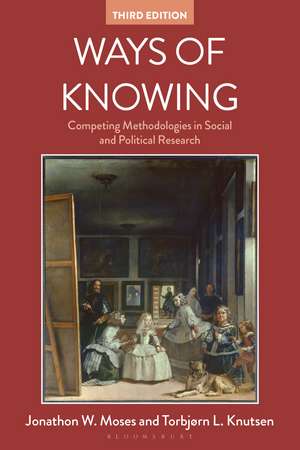Ways of Knowing: Competing Methodologies in Social and Political Research
Autor Jonathan W. Moses, Torbjørn L. Knutsenen Limba Engleză Paperback – 14 apr 2019
Preț: 254.58 lei
Preț vechi: 290.59 lei
-12% Nou
Puncte Express: 382
Preț estimativ în valută:
48.72€ • 50.68$ • 40.22£
48.72€ • 50.68$ • 40.22£
Carte disponibilă
Livrare economică 25 martie-08 aprilie
Livrare express 08-14 martie pentru 75.16 lei
Preluare comenzi: 021 569.72.76
Specificații
ISBN-13: 9781352005530
ISBN-10: 1352005530
Pagini: 364
Dimensiuni: 155 x 235 x 20 mm
Greutate: 0.54 kg
Ediția:3rd ed. 2019
Editura: Bloomsbury Publishing
Colecția Bloomsbury Academic
Locul publicării:London, United Kingdom
ISBN-10: 1352005530
Pagini: 364
Dimensiuni: 155 x 235 x 20 mm
Greutate: 0.54 kg
Ediția:3rd ed. 2019
Editura: Bloomsbury Publishing
Colecția Bloomsbury Academic
Locul publicării:London, United Kingdom
Caracteristici
Extensive body of philosophy of science literature comprehensively covered
Notă biografică
JONATHON W. MOSES Professor of Political Science, Norwegian University of Science and Technology, Trondheim, Norway.TORBJØRN L. KNUTSEN Professor of International Relations, Norwegian University of Science and Technology, and Adjunct Professor, The Norwegian Air Force Academy, Trondheim, Norway.
Cuprins
1. Introduction 2. The Naturalist Philosophy of Science 3. The Experimental Method 4. The Statistical Method 5. The Comparative Method 6. History, Interviews and Case Studies 7. Sowing Doubts about the Naturalist Methodology 8. A Constructivist Philosophy of Science 9. From Story Telling to Telling Histories 10. Comparing Contexts 11. Contextualizing Statistics 12. Interpretive Experiments 13. Conclusion.
Recenzii
No book does a better job rendering accessible so much of the history and concepts of philosophy of science for the budding social scientist.
Ways of Knowing is probably the best introductory book on the market on social science philosophy and methodologies. The book has been a regular part of the curriculum for 300 political science and social science students per year for almost 10 years at the University of Copenhagen. This is because both teachers and students are very satisfied with it.
With an elegant set-up, imaginative use of examples from inside and outside of academia, and unrelenting commitment to methodological pluralism, the third edition of Ways of Knowing remains the leading political science textbook on methodology.
The social sciences are a site of deep and divisive debate about the nature of reality and how it ought to be studied, between positivists and interpretivists, econometricians and qualitative researchers, experimentalists and observationalists. In this lucid and innovative book, Moses and Knutsen help readers make sense of a multiplicity of empirical approaches by explicating the philosophical tenets of, and research strategies that flow from, two broad methodological outlooks: naturalism and constructivism. Surveying the most prominent methods in the social sciences (experimental, statistical, comparative, and narrative-historical) the authors show how both naturalists and constructivists scholars employ each of these frameworks, but on differing logics and toward differing knowledge-producing ends. For students of sociology or political science, this text will serve as an invaluable map of the methodological terrain while making a timely case for building intellectual bridges between traditions.
With their third edition of Ways of Knowing, Moses and Knutsen carefully revise and update a must-have for every scholar of social and political research. Strengthening the strengths of their excellent textbook, they provide a comprehensive and insightful discussion of two main strands of social science methodologies and methods: naturalism and constructivism.
This is an extremely clear, straightforward and well-exemplified guide to social science. Any student struggling to grasp the idea of a social science should read chapters 2 to 6 of this excellent book, which covers experiments, statistical analysis, comparison, and historical/case study approaches. The third edition further updates and expands the diversity of techniques within each camp.
Ways of Knowing is probably the best introductory book on the market on social science philosophy and methodologies. The book has been a regular part of the curriculum for 300 political science and social science students per year for almost 10 years at the University of Copenhagen. This is because both teachers and students are very satisfied with it.
With an elegant set-up, imaginative use of examples from inside and outside of academia, and unrelenting commitment to methodological pluralism, the third edition of Ways of Knowing remains the leading political science textbook on methodology.
The social sciences are a site of deep and divisive debate about the nature of reality and how it ought to be studied, between positivists and interpretivists, econometricians and qualitative researchers, experimentalists and observationalists. In this lucid and innovative book, Moses and Knutsen help readers make sense of a multiplicity of empirical approaches by explicating the philosophical tenets of, and research strategies that flow from, two broad methodological outlooks: naturalism and constructivism. Surveying the most prominent methods in the social sciences (experimental, statistical, comparative, and narrative-historical) the authors show how both naturalists and constructivists scholars employ each of these frameworks, but on differing logics and toward differing knowledge-producing ends. For students of sociology or political science, this text will serve as an invaluable map of the methodological terrain while making a timely case for building intellectual bridges between traditions.
With their third edition of Ways of Knowing, Moses and Knutsen carefully revise and update a must-have for every scholar of social and political research. Strengthening the strengths of their excellent textbook, they provide a comprehensive and insightful discussion of two main strands of social science methodologies and methods: naturalism and constructivism.
This is an extremely clear, straightforward and well-exemplified guide to social science. Any student struggling to grasp the idea of a social science should read chapters 2 to 6 of this excellent book, which covers experiments, statistical analysis, comparison, and historical/case study approaches. The third edition further updates and expands the diversity of techniques within each camp.
